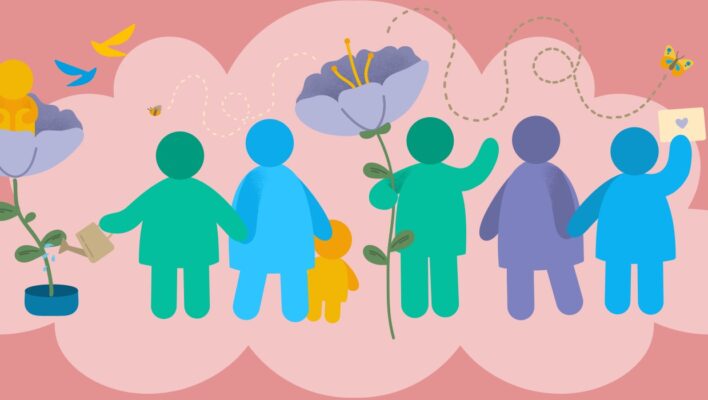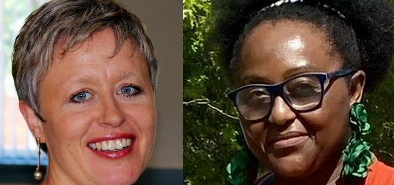Multidimensional poverty, special needs, and family law

– Artwork by Sophie Rhys
On 26 September, ATD hosted our annual online webinar for friends, allies, and those who are merely curious about our work. Lareine Mouoguia, from ATD’s National Leadership Team, and Celeste Greenwood, an ATD ally and a barrister-at-law, discussed the multidimensionality of poverty, family law, special needs, and the right to family life.
Research findings about poverty
Celeste: Can you tell me about the findings of ATD’s 2016-19 participatory research with Oxford University about Understanding Poverty in All Its Forms?
Lareine: We found that poverty is multidimensional. This means it affects every part of a person’s life. It is about the level of financial resources you have access to but it is also social and psychological. It impacts your dignity.
With financial insecurity and debt, you feel like you’re on the outside looking in – you cannot afford to take part. You are worrying about money all of the time. If you are starving, your brain goes into pause.
Another dimension of poverty is feeling shame and stigma. You blame yourself. You feel like a burden. You feel bullied and bulldozed.
You feel pushed away, pressed down, and not wanted.
There are also systems and policies that disempower you. In the system, you are a number instead of a person. You are dehumanised. You are part of a system that leaves you waiting in fear and uncertainty. That fear and uncertainty destablises you and hijacks your future.
Damage and lack of control
Poverty damages your health and well-being. You don’t have time to smell the flowers because the stress of life gets in the way. You feel lost in the fog, like you are disconnected or cast adrift. Poverty shortens lives.
Another dimension is that you have no control over choices. Your horizons are restricted because your focus is on survival. Poverty is a dungeon of boredom, staring at the same four walls, chained up in a place where nothing happens. Poverty is a spider’s web, almost impossible to escape.
And the final dimension of poverty that ATD identified was that your skills and contributions are not recognised. You have to break down barriers and be resilient. You aren’t recognised for the wealth of life skills that you have.
In poverty, we might sometimes feel broken by experience, but we are generous in spirit, solidarity and community spirit.

Poverty in family court
Now I have a question for you, Celeste. You are a family barrister. How does poverty influence a family’s interactions with social services and family court?
Celeste: Thanks Lareine. First I would like to acknowledge the many people with whom I’ve worked in my professional life as a family law barrister who live in poverty or had experience of living in poverty, acknowledge their dignity and resilience during our time working together and their kindness of spirit. I am sorry to say that I saw in them and their lives the sorts of harmful impacts that you have so eloquently described.
I would note that in my more than 20 years working in the family courts the vast majority of the cases in which I worked involved families living in poverty; hardly any cases in which I worked involved families that we might properly describe as ‘middle class’ socio-economically.
The wrong yardstick
Sadly, in my experience, the stereotypes and stigma that are applied to people living in poverty were very apparent in families’ interactions with social services and the child protection court system. All too often, in my opinion, the fact of living in poverty and its practical, economic as well as mental health and wellbeing impacts was not appreciated.
Rather, it seemed that parents were blamed for being in poverty.
We talk a lot in the family court about ‘good enough parenting.’ I am concerned that too often the yardstick for that is based on what we might term a middle-class socio-economic paradigm.
A desperate need for change
I think we need to really ‘see’ and wake up to the link between families living in poverty and involvement with social services. The Children Act of 1989, that sets the framework for child protection and the State’s intervention in the family, focuses on providing support as preliminary interventions aimed at supporting families so that court proceedings don’t become necessary.
A recent report found that in this country we are spending far more on funding alternative out-of-family homes for children than we are on supporting them to remain at home with their families.
We desperately need to change this. Based on my professional experience I am concerned that we may be unnecessarily permanently separating some children from their families – families that could be kept together if we adopt a ‘problem-solving’ approach that focuses much more on supporting families in their communities.
Now I have another question for you. When someone in the family is on the autism spectrum or has learning disabilities, how does that impact experiences of poverty and social services?
Autism, learning disabilities, and children’s social care
Lareine: When your child has autism, simple tasks like getting dressed in the morning can be challenging. They might really want to wear two different coloured socks. But at school, where the child might mask his autism, they think a parent is neglecting the child by sending them to school with socks of two different colours. But that is not neglect!
As a parent, you just need support but you can feel ashamed to go and ask for help. And then when the school sees that you are struggling, they start talking about child protection. This is wrong! Many parents, when they struggle, they do ask social services — but they usually don’t get help.
It’s almost like social services are refusing to help the parent on purpose so that afterwards they can come and say “you are neglecting your child”.
Associating poverty with negligence is so inhuman. This is wrong.
Sometimes as a parent of a child with special needs, you feel tired and drained. But if you say that to a social worker, you can be reported as an unfit mother and then you have to go to court.
Horrible attitudes and invasive assessments
It can also be very difficult for parents who have autism or a learning disability. From the first time you are pregnant, social workers are investigating because they assume you will not be able to look after your child. Their attitude is horrible, and even when you have already shown that you are a responsible parent, the next time you get pregnant, they start investigating all over again. You are not listened to and you have to constantly keep proving that you can look after your child.
When they are investigating, they might send you to an assessment centre where you will be on camera 24/7.
Or they come to sit in your house from 7 in the morning, to 7 at night, just watching the parents.
It is just horrible because their attitude is: “Don’t talk to us, we’re not in the room. Like we don’t exist”. But the whole family can see that they’re there for months and months, which can be extremely frustrating and invasive.
A devastating lack of support
So often, social workers are looking for what’s negative so they pick one point and exaggerate it. They’re not autism experts. So if your children have autism, they don’t understand that children mask their autism sometimes when they’re out in public, but then they come back home and act out because of the problems they’ve had during the day.
In all these situations, you end up scared to ask social services for support and help, or just advice because of your bad experiences. When you know that they’ll judge you and investigate you, you feel you can’t get the support you need.
Celeste, you’ve worked with families in these situations in court. Can you give us an example of what you see?
Being watched at all times
Celeste: Thanks Lareine. Unfortunately, I have experience of all the situations you have highlighted. For example in relation to families being assessed in residential assessment units, I worked with one mother who was in an assessment centre for 10 months!
I really don’t know how anyone can cope well with being watched at all times and living in such a false situation; I take my hat off to them for undergoing it for the sake of their family.
I have been involved in cases in which a subject child had autism and recognise the experiences you have related. Clearly, we need all the professionals involved with families to have a very good working understanding of what being and having a child with autism is like; only then will we understand and see neglect when it really is happening as opposed to wrongly labelling reasonable and understandable parenting as ‘neglect.’
A disconnect with middle-class practices
I have also had the privilege of working with many parents with learning difficulties or disabilities. These cases have always and continue to cause me grave concern. In the family courts we have developed the term ‘substituted parenting.’ This is used when social services argue that the amount of support required to maintain children at home amounts to professionals, not the parents, caring for the children.
Jody Torode, who is also an ally of ATD Fourth World, has just started her PhD studies, in which she will be looking at the experiences of mothers with learning difficulties or disabilities.
She is interested in the disconnect with society’s attitude to middle-class parents who have enough financial resources to delegate or outsource caring for their children to a nanny or au pair.
She will explore the fact that society countenances this practice but doesn’t when it comes to the State providing that level of support to parents, such as those with learning disabilities, who need it because of their inherent struggles but cannot afford to do so.
State treatment needs to be reviewed
I agree with the argument that this is wrong in principle and would repeat my fear that we are at risk of unnecessarily permanently separating some children from their families who could, if the family were properly supported by the State, remain at home and have their right to be brought up by their parents respected.
I look forward to hearing about Jody’s work and I’m sure it will make a massive contribution to how the State, through social services and the family courts, treats such parents and their children.
How the State treats parents with learning difficulties or disabilities is one of the many areas of child protection and the family court system that I believe needs to be reviewed.
We need a society-wide informed and comprehensive conversation about what we expect the child protection to do. In what circumstances do we agree the State should intervene? To what extent do we want the State to support families to stay together and how much are we prepared to pay for that.

